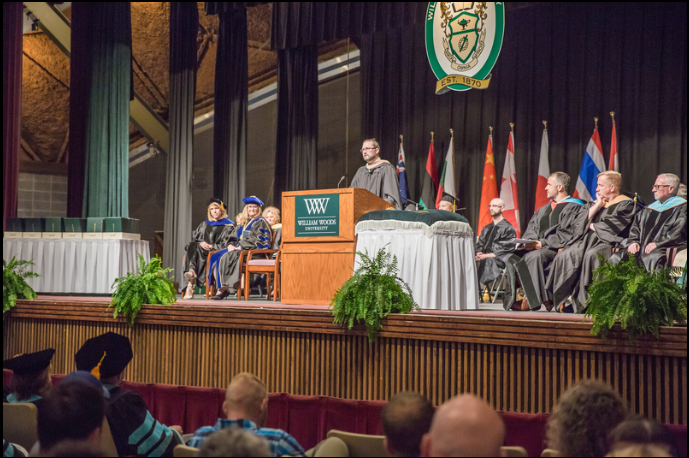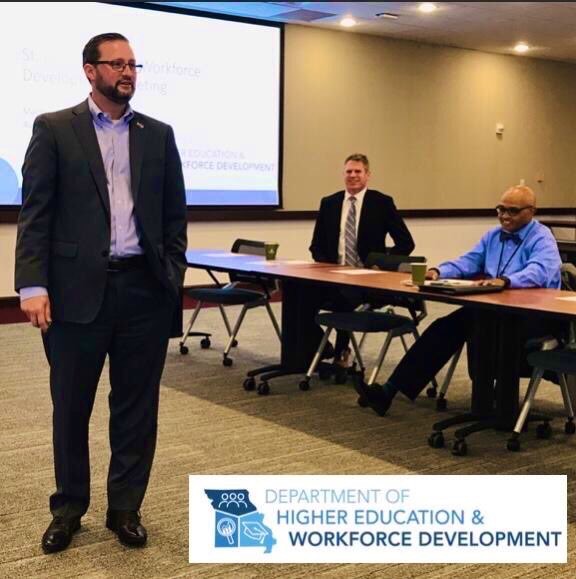I am a big fan of William Woods University! I chose William Woods to get my MBA, because it has a great reputation in my sector of the government and in the private sector in the Central Missouri region. I enjoyed the 18-month cohort set up and as an adult learner my experience with the MBA program was awesome. I later worked on my doctorate of management from Webster University, which I learned of from my time and relationships developed at WWU, as some of the WWU administrators and faculty had also gone through the program. When I got the opportunity, I was excited to go back and teach at WWU because the college has a great mission. It is special to come back to hone my skills where I received my MBA and be able to deliver the same course work back to the soon-to-be fellow alumni.

Applying my MBA degree
The application of the liberal arts in the MBA program at William Woods stood out to me. Going through that process of developing a business plan, you are putting a blueprint for not just business but an organization. It allowed me to have a broader understanding of how the greatest organizations intersect and how by aligning the systems with the organization you can actually improve outcomes. It is important in business because you have to think more broadly and understand what decision impacts other parts of the organization how resource allocation can impact other areas of the organization. More specifically, the finance and accounting aspects are robust for any business or organization leader. Even if you are not going to be a Certified Public Accountant (CPA) or a financial expert, it’s important to have foundational understanding of how to read financial statements, and how budgets work. I was able to apply directly to part of my job where I was the chief budget officer for accounting in the government. I now oversee a 98 million dollar budget for a large state agency. If I had not had the exposure in my MBA program, I would be challenged to fully understand how to manage budgets effectively.

Working for the State of Missouri as the Workforce Development Office Director
The average day working for the state of Missouri is busy for me. I was appointed by the Governor of Missouri, and am a senior executive level officer. I oversee 324 employees and $98 million budget. My job is to manage Missouri’s public workforce system. What that means is managing all of the federal dollars that come to the state to help people who are unemployed or underemployed, working with individuals who want to enter into job enrichment programs or helping businesses and communities develop strategies to attract and retain talent. The biggest challenge in today’s economy is ensuring that we have a labor market that is stable and resilient. We focus on two key areas every day and figure out how we get more people into the workforce and how we help those people stay in the workforce. We look at how can we help Missouri workers to be more productive and resilient as technology accelerates and businesses increase exposure to global marketing places. Our job is to make sure that Missouri employees are competitive and productive, which means Missouri business will be competitive and productive.
Gaining insight on the workforce
The biggest thing is soft skills. Understanding how to work as a team, be a critical thinker and problem solver, and to take initiative. A lot of it is earlier in your career, when you need to be patient, engaging and a “sponge.” You are going to learn a ton on the job in your first two years, not only how to perform a technical process but also style norms on the job. Things like: how do I interact and engage with my superiors or subordinates? How do I interact with my colleagues? Critical thinking, problem solving, communication and initiative – those are the things that are most important when you first get a job and then taking those two years to hone those and build a reputation. These things are often overlooked. You need the technical expertise, but once you get on the job technical expertise will only go so far. Critical thinking, taking initiative, being a problem solver and communicating effectively will help you grow into a leader in an organization.

Teaching graduate classes
Graduate school is much different because the idea is that you learn as much from your peers as you do from the instructor. I like to have everyone set up in a square or “U” shape, and I sit in the middle while we have a lot of discussion. I might be lecturing on certain topics providing the fundamental based knowledge that needs to be presented, and the conversation might go to the practical applications of these concepts to the real or business world. We do a lot of peer engagement and peer response with projects, because it is not just my feedback that’s important but feedback from peers. We all learn from each other that way.

The Uniqueness of the MBA program
The students are stakeholders in this process too. They are able to engage and participate. I am big on you cannot learn by having someone feeding you information. You have to engage, process and apply the information. That help creates more of an exciting class for the students. As they come to class, students are able to participate actively engage. Management and Leadership translates in any discipline. It does not matter if you are an art or music major, in science or in education; management and leadership are principles that are important across the board. I think that the topic and concepts that I instruct are viable life skills and skills specific to business across all disciplines.
I’m now in my second year and am the first instructor that students have in the MBA-in-5 program. I get to expose them to what it is going to be like in graduate school and help them to understand how it might be different level of thinking. I enjoy that. My job is to help set them up for success throughout the program, helping set expectations about what it will be like and give them some foundational tools and resources to go throughout the program.

